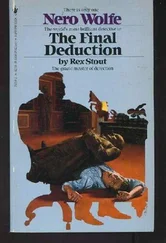“Not evidence. You may be lying. I’m only explaining the delicacy of our position. You told Mr. Goodwin you would pay him a thousand dollars to find your cigarette case and keep it for you, and give it to you later at his discretion. We can’t accept that offer. It would engage us not to turn it over to the police even if it became apparent that it would help to identify or convict a murderer, and that’s too great a risk for a thousand dollars. You may have it for fifty thousand, cash or a certified check. Do you want it?”
I think he meant it. I think he would have handed it over for thirty grand, or even twenty, if she had been dumb enough to pay it. He had let me go up to 82nd Street with five Cs in my pocket for one specific reason, to see if I could flush a prospect for a worthy fee, and if she was fool enough, or desperate enough, to pay twenty grand, not to mention fifty, for her cigarette case, he could call it a day and leave the murder investigation to the law. As for the risk, he had taken bigger ones. He was saying only that he would give her the case, not that he would forget about it.
She was staring at him. “I didn’t think,” she said, “that Nero Wolfe was a blackmailer.”
“Neither does the dictionary, madam.” He swiveled to the stand that had held the three Websters he had worn out and now held a new one. Opening it and finding the page, he read: ‘Payment of money exacted by means of intimidation; also, extortion of money from a person by threats of public accusation, exposure, or censure.’ ” He swiveled back. “I don’t fit. I haven’t threatened or intimidated you.”
“But you...” She looked at me and back to him. “Where would I get fifty thousand dollars? You might as well say a million. What are you going to do? Are you going to give it to the police?”
“Not by choice. Only under the compulsion of circumstance. A factor would be your answers to my questions.”
“You haven’t asked me any questions.”
“I do now. Were you in that room Sunday evening or night?”
“No.” Her chin was up.
“When were you last there? Before today.”
“I haven’t said I was ever there.”
“That’s egregious. Your behavior this morning. Your offer to Mr. Goodwin. You had keys. When?”
She set her teeth on her lip. Five seconds. “More than a week ago. A week ago Saturday. That’s when I left the cigarette case. Oh my God.” She extended a hand, not a professional gesture. “Mr. Wolfe, this could ruin my career. I haven’t seen him since that night. I don’t know who killed him, or why, or anything. Why must you drag me into it? What good will it do?”
“I didn’t drag you there this morning, madam. I don’t ask how often you visited that room because your answer would be worthless, but when you did visit it were others there?”
“No.”
“Was anyone ever there when you were besides Mr. Yeager?”
“No. Never.”
“But other women went there. That’s not surmise, it’s established. Of course you knew that; Mr. Yeager was not concerned to conceal it. Who are they?”
“I don’t know.”
“You don’t deny that you knew there were others?”
She thought she was going to, but his eyes had her pinned. She swallowed the yes and said, “No. I knew that.”
“Of course. He wanted you to. His arrangement for keeping slippers and garments testifies that he derived pleasure not only from his present companion but also from her awareness that she had — uh — colleagues. Or rivals. So surely he wasn’t silent about them? Surely he spoke of them, in comparison, in praise or derogation? And if he didn’t name them he must have aroused conjecture. This is my most instant question, Miss Duncan: who are they?”
I had heard Wolfe ask questions of women that made them tremble, or turn pale, or yell at him, or burst into tears, or fly at him, but that was the first time I ever heard one that made a woman blush — and her a sophisticated Broadway star. I suppose it was his matter-of-fact way of putting it. I didn’t blush, but I cleared my throat. She not only blushed; she lowered her head and shut her eyes.
“Naturally,” Wolfe said, “you would like this episode to pass into history as quickly as possible. It might help if you will tell me something about the others.”
“I can’t.” She raised her head. The blush was gone. “I don’t know anything about them. Are you going to keep my cigarette case?”
“For the present, yes.”
“You have me at your mercy.” She started to rise, found that her knees were shaky, and put a hand on the chair arm to help. She got erect. “I was a fool to go there, an utter fool. I could have said — I could have said anything. I could have said I lost it. What a fool.” She looked at me straight, said, “I wish I had clawed your eyes out,” turned, and headed for the door. I got up and followed her, passed her in the hall, and had the front door open when she reached it. She wasn’t very steady on her feet, so I watched her descend the seven steps to the sidewalk before I shut the door and returned to the office. Wolfe was in his reading position and had opened his book, An Outline of Man’s Knowledge of the Modern World , edited by Lyman Bryson. I had spent an hour one afternoon looking it over, and had seen nothing about modern satyrs.
Six years ago, reporting one of Wolfe’s cases, one in which no fee or hope of one was involved, I tried a stunt that I got good and tired of before I was through. It took us to Montenegro, and nearly all the talk was in a language I didn’t know a word of, but I got enough of it out of Wolfe later to report it verbatim. I’m not going to repeat that experience, so I’ll merely give you the gist of his conversation with Mr. and Mrs. Perez when he came down from the plant rooms at six o’clock and found them there. It was in Spanish. Either he took the opportunity to speak one of his six languages, or he thought they would be freer in their native tongue, or he wanted to rile me, I don’t know which. Probably all three. After they had gone he gave me the substance.
This isn’t evidence; it’s just what they said. They didn’t know who came Sunday evening, man or woman, or how many, or when he or she or they had left. They didn’t know how many different people came at different times. Sometimes they had heard footsteps in the hall, and they had always sounded like women. If a man had ever come they hadn’t seen or heard him. No one had ever been in the room when they went up to clean; they didn’t go up if the elevator was up there, but that had happened only five or six times in four years.
They had heard no shot Sunday evening, but even the floor of the room was soundproofed. When Perez went up at midnight there had been a smell of burnt powder, but he thought it was a weak smell and she thought it was a strong one. There had been nothing in the room that didn’t belong there — no gun, no coat or hat or wrap. Yeager had been fully dressed; his hat and topcoat had been on a chair, and they had put them in the hole with the body. None of the slippers or garments or other articles were out of the drawers. The bed had not been disturbed. Everything was in place in the bathroom. They had taken nothing from Yeager’s body but his keys. They had cleaned the room Monday morning, vacuumed and dusted, but had taken nothing out of it.
They had paid no rent for their basement. Yeager had paid them fifty dollars a week and had let them keep the rent they collected for the rooms on the four floors. Their total take had been around two hundred dollars a week (probably nearer three hundred and maybe more). They had no reason to suppose that Yeager had left them the house, or anything else, in his will. They were sure that none of the tenants had any connection with Yeager or knew anything about him; the renting had been completely in their hands. They had decided that one hundred dollars wasn’t enough to pay Wolfe and me, and though it would take most of their savings (this isn’t evidence) they thought five hundred would be better, and they had brought half of that amount along. Of course Wolfe didn’t take it. He told them that while he had no present intention of passing on any of the information they had given him he had to be free to use his discretion. That started an argument. Since it was in Spanish I can’t give it blow by blow, but judging from the tones and expressions, and from the fact that at one point Mrs. Perez was up and at Wolfe’s desk, slapping it, it got pretty warm. She had calmed down some by the time they left.
Читать дальше












